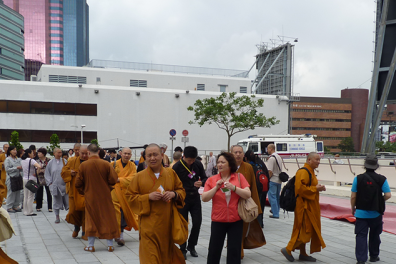Creation of the Inalco-Sheng Yen Professorial Chair, pioneering studies of Buddhism in the modern and contemporary Chinese world

In February 2021, the Fondation Inalco-Langues O' and Taiwan's Fondation Education Sheng Yen signed the agreement to create the "Inalco-Sheng Yen Professorial Chair for Studies on Buddhism in the Modern and Contemporary Chinese World" for an initial 3-year term (2021-2024). This is the Inalco-Langues O' Foundation's second major project, following that supporting the "Hospitality, Mediations, Migrations" inter-university diploma (September 2020), and the first implemented in the research sector.
This chair extends and complements the activities of the Centre for Interdisciplinary Studies on Buddhism (CEIB), itself attached to the French Institute for Research in East Asia - IFRAE (Inalco-Université de Paris-CNRS). It is headed for this term by Mr. Zhe JI, Professor of Sociology of Religion in Modern and Contemporary China at IFRAE and Inalco's Chinese Studies Department, co-founder and director of CEIB.
Its creation is in line with the partners' desire to continue and revive the long tradition of Buddhist studies in France, and at Inalco. It aims to promote the emerging field of study of Chinese-language Buddhism in modern and contemporary times from a social science perspective. This chair is part of a scientific complementarity with the CEIB and IFRAE and corresponds to the establishment's policy.
In fact, the Inalco is the only establishment in France to have offered, for decades, non-confessional teaching on Buddhism, in particular Chinese Buddhism, at the Licence level. France was already the first European country back in the XIXè century to work on Buddhist studies. Since 2019, at Inalco, the Parcours Religion is a new cross-disciplinary course offered to Licence students. Following in the footsteps of leading SHS universities in Asia and North America, Inalco paved the way for the scientific study of Buddhism with the creation, in 2016, of the CEIB, the first interdisciplinary research center in this field in France, in partnership with the EPHE and the Collège de France. This center is associated with the research of IFRAE, created in 2019, on the "History and sociology of religion" axis. In this way, Inalco is perpetuating a prestigious heritage that stems from the great names in the Institute's teaching. These include Stanislas Julien (1799-1873), Paul Demiéville (1894-1979), Rolf A. Stein (1911-1999), Catherine Despeux (born 1945) and Lin Li-kouang (1902-1945), a linguist and Buddhologist of Chinese origin who taught at Langues O' from 1933 to 1944, and to whom CEIB's eponymous conference pays tribute.
The Sheng Yen Education Foundation of Taiwan, founded in 2006 by the monk Sheng Yen (1930-2009), is recognized as a private foundation of public utility by the Ministry of Education of Taiwan. It actively supports high-level academic studies on Chinese Buddhism, and is widely recognized internationally for its generosity and respect for the scientific autonomy of its partners. For example, it supports various fellowship and professorship programs, not only in Taiwan but also internationally: it currently funds two permanent professorial chairs at Columbia University (since 2006) and Florida State University (since 2011), as well as a contractual professorial chair in Taiwan (since 2016). Through the research activities carried out by the CEIB, it has funded several post-doctoral positions at the CEIB between 2017 and 2020, thus contributing to Buddhist studies in France.
The Inalco-Langues O' Foundation's mission is to foster the development of Inalco through the support of academic and strategic projects. These projects concern research and teaching on languages and civilizations, the institution's influence in France and internationally, its social commitment, the development of its networks, and the professional integration of its students. The projects supported are chosen and carried out with a focus on innovative initiatives and in line with Inalco's values of openness and diversity.
The Chair's scientific project is led by Professor Zhe JI, whose many international collective projects and works, carried out over the past twenty years in the Chinese world, echo the Foundation's policy of internationalization.
His fieldwork, begun in 1994, covers several municipalities and provinces in China, including Shanghai, Beijing, Hebei, Liaoning, Jiangxi, Jiangsu, Zhejiang, Fujian and Gansu. The geographical scope and regional diversity of the data collected contribute to an analysis adapted to the complexity of Buddhism and the heterogeneity of the Chinese world.
This project proposes to study various types of groups, from official associations to informal and clandestine networks, from "orthodox" monasteries to projects initiated by lay people. The field is not limited to People's China, and will also include groups based in Taiwan, Hong Kong, Southeast Asia, Europe and North America, affiliated with Buddhist traditions. The aim is to study Chinese Buddhism in its diversity and creativity, but also in its geopolitical transversality.
The Chair will be dedicated to:
- strengthen research, teaching and the training of doctoral students within CEIB and IFRAE;
- recruit doctoral students and attract young researchers;
- renew and strengthen its cooperation with French and international research programs and research centers in the field internationally ;
- build complementary and synergistic relationships with the Foundation's other existing Chairs in the USA and Taiwan, and with the Chung-Hwa Institute of Buddhist Studies (CHIBS, one of the Foundation's main partners in Taiwan);
- create a journal, publish collective works and articles in leading journals, participate in and organize international colloquia, etc.
"Unique and original, this chair should mark the history of the discipline in France, contribute to Inalco's scientific and international influence, and thus consolidate the Institute's status as "the beating heart of French and European sinology for over two centuries"1 " (Zhe JI)
1 Emmanuel Macron's speech, January 8, 2018, Xi'an, China.
The Chair's scientific project
Objective
The research project for the Inalco-Sheng Yen Chair is a continuation of Zhe JI's previous research over more than twenty years. The aim of this research is to explore the process, dynamics and complex consequences of the evolutions of Chinese Buddhism in the contexts of modernity and globalization, and, on this basis, to analyze in depth the logics of religious change in the multiple societies of the contemporary Chinese world (People's China, Taiwan, Hong Kong and the Chinese diaspora).
Approaches and themes
The scientific questions at the heart of the project are based on a set of hypotheses and reflections derived from work already carried out, as well as a number of observations and findings made over years in the field. Thus, the project proposes:
- to analyze how collective and individual actors mobilize new resources to renew the balance of their relative relationships, which in turn modifies the background of the landscape of this religion. Studies will focus on new Buddhist centers and networks, the functioning of official monastic institutions, major Buddhist figures, and the training of clergy elites.
- to account for the internal dynamics of Buddhism and study the diversification of modes of Buddhist sociability. Part of the work will therefore be devoted to analyzing the issues and strategies developed, in a variety of social contexts, by Buddhist groups, notably through the production and mediatization of symbolic references, the management of legitimacy and collective memory, and the organization of the activity of believers and practitioners. In short, the aim is to analyze new Buddhist discourses and practices, as well as the promotion and legitimization of these religious innovations.
- to place Buddhism in the context of its relations with other institutions and social forces, studying the tensions, negotiations and collaborations between them. Religious change is never a purely religious affair, undertaken only by groups of dedicated clerics and people thirsting for spiritual and moral support; it is a complex social game in which both religious actors and multiple social forces outside the religious field interact. For the present project, particular attention will be paid to the relationship between Buddhism and politics.
- analyze historical conjunctures, in order to better contextualize the evolutions of Buddhism and highlight the main forces acting behind these evolutions. Research themes will therefore have to be set within a broader historical horizon, going back to the Republican era (1912-1949) and even earlier, in order to better illuminate the dialectic between continuity and discontinuity.
- to also study Chinese Buddhism in the context of the multiple trajectories of Chinese modernity (PRC, Taiwan, Hong Kong) and globalization.
Interview with the project leader: 4 questions to ...Zhe Ji

